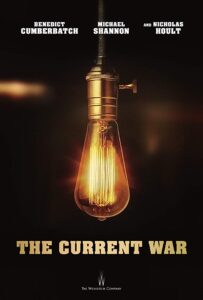Handsomely made and well-acted, delayed energy epic is entertaining history lesson.


Originally slated to be released in November of 2017, “The Current War” got ensnared in the demise of Harvey Weinstein that caused the breakdown of his business. Looks like the delay wasn’t a bad thing, as it allowed for a re-edit that re-branded the film as the “Director’s Cut,” which should result in improved reviews. After all, back in 2017, after it premiered at the Toronto International Film Festival reviews were pretty dismal. While I, thankfully, did not see that cut, I enjoyed this one, and I learned a few things too.

Taking place in the United States in the years after the Civil War, “The Current War” tells the story of two electricity titans, Thomas Edison and George Westinghouse. The race to electrify the nation is on, and the choice is between direct or alternating current. Edison advocates for direct current (or “DC”), whereas Westinghouse has put his business might behind the alternating variety (or “AC”). While the victor may be widely known to us, the battle the two wage is nothing short of fascinating, and so is the film, directed by Alfonso Gomez-Rejon (“Me and Earl and the Dying Girl”) from a script by Michael Mitnick (“The Giver”).
A prestige picture on almost every level, it’s an awfully good looking film. Even the fake beards work. The cities and workspaces are detailed and appear to be period accurate. The camera sweeps rhythmically through the set pieces with grandeur, as the score from Volker Bertelmann and Dustin O’Halloran (the team nominated for the Oscar in 2016 for “Lion”) swells appropriately. Watching this zippy film, it’s hard not to get caught up in the events that helped shape our world today.

The cast is deep. Benedict Cumberbatch adopts an American accent playing the ambitious Thomas Edison. He’s great here, as the tortured inventor, whose commitment to his family collides with his business aspirations. And Edison’s cut-throat tinkerer contrasts well with the accomplished, professional, businessman Westinghouse, played impressively by a reserved Michael Shannon. As Westinghouse, Shannon, who made his mark often by inhabiting unhinged characters, gets to play a fairly mainstream guy, with extraordinary business acumen. And the film is able to balance the two men’s backstories well.

While aspects of the Edison-Westinghouse competition are handled in a perfunctory fashion (checking off the boxes, so to speak), there are moments that will grab the viewer emotionally. Edison’s personal family struggles are impactful, and Westinghouse is haunted by a past event on the battlefield. We learn something of what shaped these titans.
The supporting cast includes Spider-Man himself Tom Holland, in the significant role of Samuel Insull, Edison’s secretary. And Holland is good, as the practical voice that Edison desperately needed as he battled Westinghouse. Katherine Waterston is excellent as Marguerite Westinghouse, the confidant that husband George sought for support and guidance. Their relationship is refreshing. Nicholas Hoult plays Nikola Tesla appropriately tweaked, providing the film a few choice comedic moments.

If there is a failing, “The Current War” does feel a little by-the-numbers, at times. This makes the movie seem more like a history lesson, and less like a dramatic, epic feature film. But I think that’s the point. Telling this story of the groundbreaking historical moments is more important than merely entertaining the viewer. This is a meaty, informative bit of filmmaking. And while liberties are, no doubt, taken for dramatic effect, there’s little here that distracts from covering the events that brought power to a growing nation at a pivotal time.
Given the reception that this “Director’s Cut” is likely to receive from critics, one wonders whether the original version will ever see widespread distribution. Regardless, this one certainly isn’t the failure that critics said of its predecessor.
